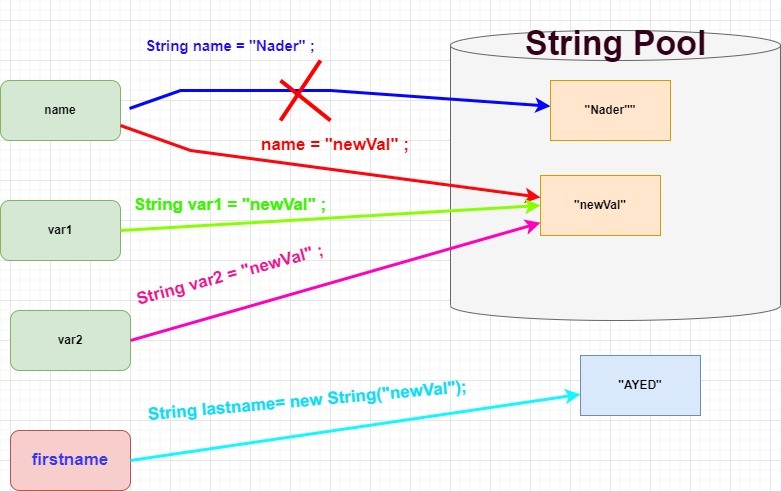Why Are Strings Immutable in Java? Trick Factors and Benefits Described
Wiki Article
What Is Unalterable Strings and How It Works
In the realm of shows, recognizing the idea of unalterable strings is extremely important for creating robust and secure applications. Immutable strings describe strings that can not be changed after they are created, ensuring data integrity and predictability within the code. This essential concept plays a critical role in numerous programming languages and offers an one-of-a-kind technique to managing information. By exploring the details of how unalterable strings function, one can reveal a world of advantages and possibilities that can raise the top quality and efficiency of software advancement.The Basics of Unalterable Strings
Immutable strings, as an essential concept in programming, are character sequences that can not be changed once they are created. This implies that as soon as a string is assigned a worth, that value can not be modified. In languages like Python and Java, strings are immutable things, resulting in numerous implications in regards to memory management and information integrity.Among the crucial advantages of immutable strings is that they give a complacency in information control. Given that the content of an immutable string can not be changed, it makes sure that the initial data continues to be intact, lowering the danger of unintentional modifications during program implementation (Why are strings immutable in Java?). This building additionally streamlines debugging processes, as programmers can trust that once a string is defined, its worth will not be accidentally changed
In addition, immutable strings help with efficient memory use. When a new string is created based on an existing one, instead of modifying the initial string, the new worth is kept individually. This method boosts performance by minimizing memory fragmentation and simplifying memory allotment procedures. Generally, understanding the essentials of unalterable strings is crucial for grasping programming principles and enhancing code efficiency.
Benefits of Unalterable Strings
Structure upon the protection and efficiency advantages of unalterable strings, their benefits prolong to enhancing code integrity and streamlining simultaneous shows tasks. By being unalterable, strings can not be modified after creation, which eliminates the danger of unplanned modifications in the information they save. This integral immutability guarantees that when a string is produced, its worth remains constant throughout the program's implementation, decreasing the chances of insects triggered by unexpected modifications.Furthermore, immutable strings add to code reliability by making it easier to reason about the state of a program. Since strings can not be changed, programmers can rely on that a string will always hold the exact same value, streamlining debugging and maintenance efforts. This predictability results in much more stable and reliable codebases.

Implementation in Programs Languages
Within different programs languages, the consolidation of immutable strings is a basic aspect that affects just how information is managed and manipulated within code structures. The implementation of unalterable strings differs throughout various shows languages, with each language offering its very own mechanisms to sustain this concept.

On the other hand, languages like C and C++ do not have integrated support for immutable strings. Designers in these languages should by hand carry out immutability by implementing guidelines within their code to stop direct modifications to string things.
Ideal Practices for Dealing With Immutable Strings
When managing unalterable strings in shows languages like Java and Python, sticking to ideal techniques ensures secure and reliable information adjustment. Among the essential ideal practices is to make use of StringBuilder or StringBuffer rather than straight adjusting strings, particularly when managing substantial concatenation procedures. These classes give mutable options for string manipulation, aiding to stay clear of unneeded memory appropriations and boosting efficiency.Additionally, when working with delicate information such as passwords or API keys, it is essential to prevent storing them as plain message in immutable strings. Utilizing secure storage devices like char arrays or specialized collections for dealing with delicate info helps alleviate security threats linked with immutable strings.
Real-world Applications and Examples
Checking out functional implementations of immutable strings in various markets discloses their substantial effect on data stability and system dependability. In the health care industry, unalterable strings play a crucial role in making sure the safety and confidentiality of patient information. By stopping unauthorized adjustments to delicate details such as medical records and prescriptions, immutable strings assist keep conformity with stringent privacy guidelines like HIPAA.Banks additionally take advantage of the immutable nature of strings to boost the protection of client data and deal records. Unalterable strings assist avoid fraud and unapproved alterations to economic info, offering a robust protection against cyber hazards and guaranteeing the depend on and confidence of customers.

Conclusion
Finally, unalterable strings are taken care of and unchangeable series of characters that offer advantages such as thread safety and boosted performance in shows. They are carried out in numerous programs languages to ensure data stability and protection. Finest methods for dealing with immutable strings consist of avoiding straight adjustments and making use of techniques that return brand-new string things. Real-world applications of unalterable strings browse around this site consist of information encryption, caching, and string manipulation jobs.Unalterable strings refer to strings that can not be altered after they are created, making certain data integrity and predictability within the code. When a brand-new string is created based on an existing one, rather than customizing the initial string, the brand-new worth is kept separately.In languages like Java and Python, strings are unalterable by default, implying that as soon as a string things is developed, its value can not be changed - Why are strings immutable in Java?. Ideal methods for functioning with unalterable strings include preventing direct modifications and using approaches that return brand-new string objects. Real-world applications of unalterable strings include data encryption, caching, and string manipulation tasks
Report this wiki page